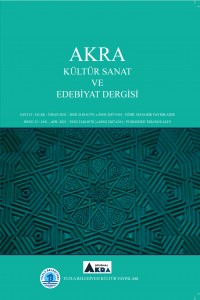Araştırma Makalesi
Yıl 2021,
Cilt: 9 Sayı: 23, 39 - 60, 10.01.2021
Öz
The relationship between the soul and the soul with the body has been one of the issues frequently emphasized by philosophy, religion and other thought systems. Whether the soul is eternal or not, its nature, and its quality in relation to the body have been among the most discussed issues. There is no doubt that the verses in the Quran have a binding aspect in the spiritual understanding of Islam. However, different opinions have emerged under the umbrella of Islam. Especially the understanding of Sufism has brought to the fore the idea that souls were created in eternity and that God has a divine side in the context of the verse "I blew my own soul". However, some Islamic scholars put forward the thesis that the soul was created in the womb from a certain stage of the fetal state. We encounter quite a lot of couplets in Mesnevi regarding the soul-body duo and their relations with each other. It is understood that Mevlânâ sometimes sees the spirit, which he considers together with the mind (akl-ı me’âd), as a divine substance on the body. Again, according to him, the spirit that was created in pre-eternity, even with God, the Absolute Being, temporarily enters the inferior body mold. In almost all fictions in the Mesnevi, it is seen that the body is humiliated and the soul is glorified. This study is about which objects and phenomena Mevlânâ constructs the soul and body in the context of these thoughts, and which I have observed in the experiential world.
Kaynakça
- Aytaç, Gürsel (1999); Genel Edebiyat Bilimi, Papirüs Yayınları, İstanbul.
- Aksan, Doğan (1993); Şiir Dili ve Türk Şiir Dili, BE-TA Basım Yayım, İstanbul.
- Arasteh, A. Reza (2000); Aşkta ve Yaratıcılıkta Yeniden Doğuş-Mevlânâ Celâleddin-i Rûmî’nin Kişilik Çözümlemesi (Çev. Bekir Demirkol, İbrahim Özdemir), Kitabiyat, Ankara.
- Bolay, Süleyman Hayri (1988); Aristo Metafiziği ile Gazzali Metafiziğinin Karşılaştırılması, MEB Yayınları, İstanbul.
- Burckhardt, Titus (1997); Aklın Aynası, 2. Baskı, (çev. Volkan Ersoy), İstanbul.
- Burckhardt, Titus (2005); İslâm Sanatı, Dil ve Anlam (çev. Turan Koç), İstanbul.
- Derbeder, Fazıl (2007); Platon ve Aristoteles’te Ruh Beden Problemi ve Karşılaştırılması, (Yayımlanmamış Yüksek Lisans Tezi), Denizli, Pamukkale Üniversitesi Sosyal Bilimler Enstitüsü.
- Kur’ân-ı Kerîm Meali (2006); (Haz. Halil Altuntaş-Muzaffer Şahin), DİB Yayınları, Ankara.
- Mevlânâ (2016); Mesnevî-i Şerif (Çev. Şefik CAN), Ötüken Yayınları, İstanbul.
- Steal, Mme de (1989); Edebiyata Dair (Çev. Safiye Hatay-Vahdi Hatay), MEB Yayınları, Ankara.
- Tahirü’l-mevlevî (2014); Mesnevî Şerhi (10 Cilt), Şamil Yayınları, İstanbul.
- Topakkaya, Arslan-Karakaya, Emel (2015); “Din-Felsefe İlişkisi Bağlamında Ruh Kavramına İki Farklı Yaklaşım: İslam ve Platon Örneği”, Erciyes Üniversitesi Felsefe Dergisi, Yıl 2015, Cilt, Sayı 2, s. 25 - 50
- https://ganjoor.net/attar/ (07.10.2020).
Yıl 2021,
Cilt: 9 Sayı: 23, 39 - 60, 10.01.2021
Öz
Ruh ve ruhun bedenle olan ilişkisi felsefe, din ve diğer düşünce sistemlerinin sıklıkla üzerinde durdukları konulardan olmuştur. Ruhun ezelî ve ebedî olup olmaması, mahiyeti, bedene nispetle niteliği en çok tartışılan konulardan olmuştur. İslam dininin ruh anlayışında şüphesiz Kur’an’daki ayetlerin bağlayıcı bir yönü bulunmaktadır. Ancak bununla birlikte İslam çatısı altında da farklı düşünceler ortaya çıkmıştır. Özellikle tasavvuf anlayışı, ruhların ezelde yaratıldığı, Allah’ın “kendi ruhumdan üfledim” ayeti bağlamında ilahî ruhun bir tarafının bulunduğu düşüncesini ön plana çıkarmıştır. Buna karşı bazı İslam bilginleri, ruhun insanın ana rahminde, cenin hâlinin belli bir safhasından itibaren yaratıldığı tezini ileri sürmüşlerdir. Mesnevî’de ruh beden ikilisi ve bunların birbiriyle olan münasebetleri ile ilgili olarak oldukça fazla beyitle karşılaşmaktayız. Mevlânâ’nın bazen akıl (akl-ı me’ad) ile birlikte değerlendirdiği ruhu, bedenin üstünde ilahi bir töz olarak gördüğü anlaşılmaktadır. Yine ona göre, ezelde yaratılan, hatta Mutlak Varlık olan Allah’la birlikte olan ruhun, geçici bir süre aşağılık olan beden kalıbına girmesi söz konusudur. Mesnevî’de geçen hemen bütün kurgularda bedenin aşağılanıp ruhun yüceltildiği görülmektedir. Bu çalışma, Mevlânâ’nın söz konusu düşünceler bağlamında ruh ve bedeni, tecrübi âlemde gözlemlediğim hangi nesneler ve olgular üzerinden kurguladığı üzerinedir.
Anahtar Kelimeler
Kaynakça
- Aytaç, Gürsel (1999); Genel Edebiyat Bilimi, Papirüs Yayınları, İstanbul.
- Aksan, Doğan (1993); Şiir Dili ve Türk Şiir Dili, BE-TA Basım Yayım, İstanbul.
- Arasteh, A. Reza (2000); Aşkta ve Yaratıcılıkta Yeniden Doğuş-Mevlânâ Celâleddin-i Rûmî’nin Kişilik Çözümlemesi (Çev. Bekir Demirkol, İbrahim Özdemir), Kitabiyat, Ankara.
- Bolay, Süleyman Hayri (1988); Aristo Metafiziği ile Gazzali Metafiziğinin Karşılaştırılması, MEB Yayınları, İstanbul.
- Burckhardt, Titus (1997); Aklın Aynası, 2. Baskı, (çev. Volkan Ersoy), İstanbul.
- Burckhardt, Titus (2005); İslâm Sanatı, Dil ve Anlam (çev. Turan Koç), İstanbul.
- Derbeder, Fazıl (2007); Platon ve Aristoteles’te Ruh Beden Problemi ve Karşılaştırılması, (Yayımlanmamış Yüksek Lisans Tezi), Denizli, Pamukkale Üniversitesi Sosyal Bilimler Enstitüsü.
- Kur’ân-ı Kerîm Meali (2006); (Haz. Halil Altuntaş-Muzaffer Şahin), DİB Yayınları, Ankara.
- Mevlânâ (2016); Mesnevî-i Şerif (Çev. Şefik CAN), Ötüken Yayınları, İstanbul.
- Steal, Mme de (1989); Edebiyata Dair (Çev. Safiye Hatay-Vahdi Hatay), MEB Yayınları, Ankara.
- Tahirü’l-mevlevî (2014); Mesnevî Şerhi (10 Cilt), Şamil Yayınları, İstanbul.
- Topakkaya, Arslan-Karakaya, Emel (2015); “Din-Felsefe İlişkisi Bağlamında Ruh Kavramına İki Farklı Yaklaşım: İslam ve Platon Örneği”, Erciyes Üniversitesi Felsefe Dergisi, Yıl 2015, Cilt, Sayı 2, s. 25 - 50
- https://ganjoor.net/attar/ (07.10.2020).
Toplam 13 adet kaynakça vardır.
Ayrıntılar
| Birincil Dil | Türkçe |
|---|---|
| Konular | Sanat ve Edebiyat |
| Bölüm | Araştırma Makaleleri |
| Yazarlar | |
| Yayımlanma Tarihi | 10 Ocak 2021 |
| Kabul Tarihi | 13 Aralık 2020 |
| Yayımlandığı Sayı | Yıl 2021 Cilt: 9 Sayı: 23 |


